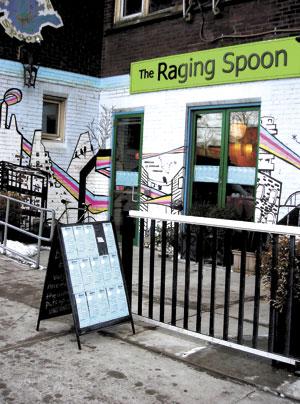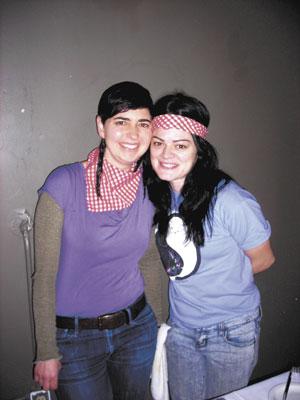
Popular queer hangout The Raging Spoon has been sold. Credit: Johnnie Walker
Everyone’s heard of “starving artists.” But how seriously do you take the term? For celebrated queer performance artist Jess Dobkin, the answer is: pretty seriously.
“Artists still constitute an under-served community,” Dobkin says. “Artists’ social contribution is really undervalued, and so many artists are among the working poor in Toronto.”
It’s with these concerns in mind that Dobkin conceived of The Artists’ Soup Kitchen, a project in the midst of a six-week run at gay-friendly Queen West café The Raging Spoon.
A soup kitchen for artists sounds like the setup for a New Yorker cartoon, but Dobkin isn’t joking: “We are serving a real hot lunch to artists every week. Each week we have a different host artist who brings their practice to the kitchen, so the menu changes each week . . . and we’re set up to serve 100 people.”
On Jan 9, Ulysses Castellanos brought a Dr Seuss–inspired meal (green eggs and ham) to hungry actors, writers and dancers.
On Jan 16, queer artists (and real-life couple) Helen Reed and Hannah Jickling served up Mystic Pizza, a lunch combining artistic pizza creations and psychic readings. A team of psychics “read” the crust and grease stains left behind on the paper lunch plates, à la tea leaves. That piece of mushroom on the left side of your plate? It probably represents a blocked section of your emotional intuition.
Besides dispensing food (and fortunes) to the city’s creatives, The Artists’ Soup Kitchen also serves as a farewell for The Raging Spoon.
“The Raging Spoon’s building has actually been sold,” Dobkin explains. “So, in a way, the soup kitchen can speak to the gentrification of Queen West and how these spaces that are important community hubs can be taken away . . . They’re just staying open for these six Mondays for The Artists’ Soup Kitchen. This is the last project that will be happening in that space.”
At least it’s going out with a delicious bang. On Jan 30, queer artist (and co-founder of The People Project for spectrum youth) Nat Tremblay will prepare a meal based on the idea of storytelling: “I want to recall animated raconteurs from my past, sharing stories around fires and at harvest celebrations to inspire laughter even in hard times.”
Then on Feb 6, Annie Onyi Cheung is designing a lunch served in miniature portions.
For Dobkin, who’s preparing a catalogue documenting the project (featuring photography, writing and recipes), The Artists’ Soup Kitchen is a relevant political dish: “We conceived the project before the Occupy movement, but I think it’s part of a bigger conversation that’s going on about funding, access to services and the economic climate in general.”
But there’s also a healthy mix of the timeless with the topical. As Dobkin explains, “We’re talking about the idea of nourishment. Physical nourishment, relational nourishment . . . And I’m interested in creating projects where we’re putting out an idea, and the people that come to the project are more than just audience members — they’re participants. They’re contributing to making it what it is.”

 Why you can trust Xtra
Why you can trust Xtra


